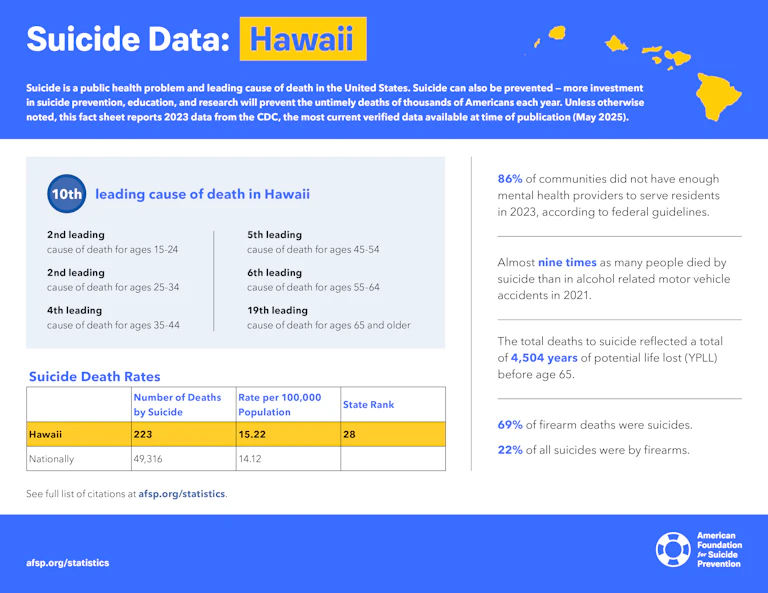Hawai’i

Hawai’i suicide prevention plans and initiatives
Hawai’i suicide prevention activities are led by the EMS & Injury Prevention System Branch within the Department of Health Injury Prevention and Control Section (DOH/IPCS) with support from the Child and Adolescent Mental Health, Adult Mental Health, and Alcohol and Drug Abuse Divisions. The Prevent Suicide Hawaiʻi Taskforce (PSHTF) is the major statewide, community-driven suicide prevention/mental health collaborative in the state. Initially formed in 2001, it is the longest-standing and most sustained mental health collaborative in the state. The Hawai‛i DOH now houses and directly supports the PSHTF, including the provision of a full-time Suicide Prevention Coordinator position.
In 2016, HCR 66 requested the PSHTF to develop and recommend a strategic plan to reduce suicides in the state 25% by 2025 and to submit a report of findings and recommendations. The resulting 2017 report outlines five strategies: (1) primary prevention, awareness, and knowledge; (2) services and intervention; (3) healing, support, and postvention; (4) research and evaluation; and (5) policy and advocacy.
Hawai’i laws
Key:
- Required by law
- Encouraged by law
- No law in place
Crisis lines and 988 implementation
- Addresses 988 infrastructure and provides for telecom user fee
- Addresses 988 infrastructure but does not include telecom user fee
- 988 law limited to creating an exploratory commission, advisory committee, or task force
Mental health parity
- Public health plans (e.g., Medicaid) regularly submit parity compliance analyses to state regulators
- Private health plans (individual and group) regularly submit parity compliance analyses to state regulators
K – 12 school suicide prevention
- Inclusion of the 988 Suicide & Crisis Lifeline and/or other crisis line(s) on student ID cards
- Student allowances for excused mental health absences
- School personnel must report student suicide risk to a parent and/or guardian
- Suicide prevention and/or mental health training for certain school personnel, annual
- Suicide prevention and/or mental health training for certain school personnel, not annual
- Suicide prevention, intervention, and postvention policies/programming
- Student education on suicide prevention
Health professional training in suicide assessment, treatment and management
- Mental health professionals receive regular training
- Mental health professionals receive one time training
- Medical/surgical professionals receive regular training
- Medical/surgical professionals receive one time training
Conversion therapy bans
- Prohibits licensed/board certified mental health providers from engaging in conversion therapy with minors under 18 years of age
- Prohibits licensed/board certified mental health providers from engaging in conversion therapy with vulnerable adults
- Prohibits use of state funds for any purpose related to conversion therapy (e.g., conducting, making a referral for, or extending health benefits coverage for)
University and college campus suicide prevention
- Inclusion of the 988 Suicide & Crisis Lifeline and/or other crisis line(s) on student ID cards
- Students receive information on available mental health and/or suicide prevention services and/or resources
- Adoption of suicide prevention/awareness policy or program
Firearms
- Process for extreme risk protection orders (ERPOs)
- State voluntary do not sell list